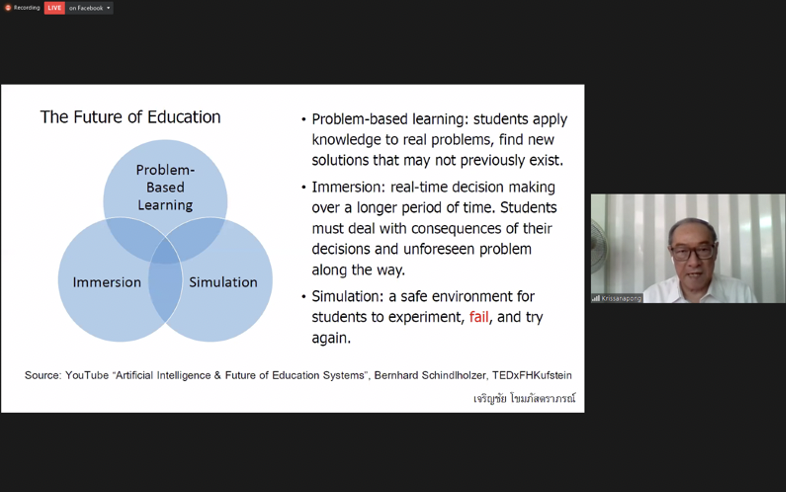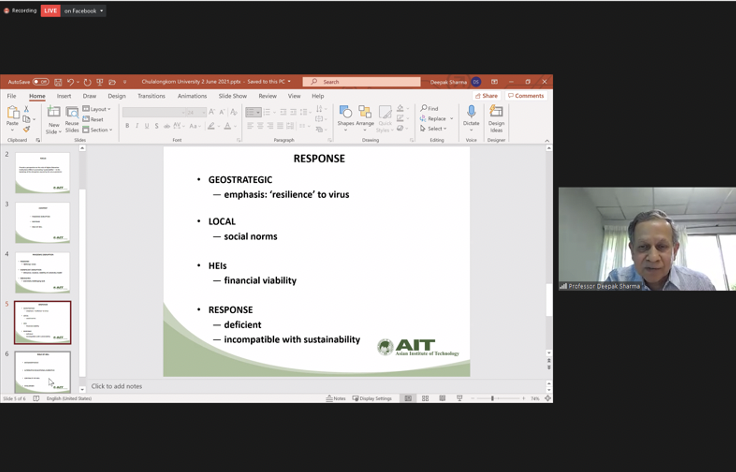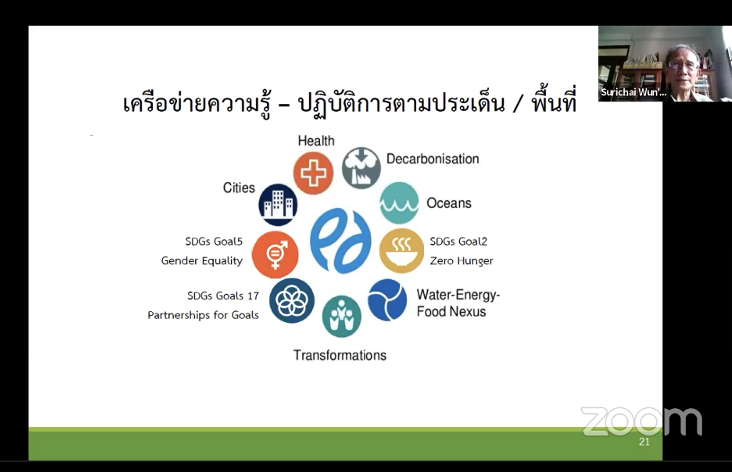(Report by HuSE, Chulalongkorn University, edited by ProSPER.Net Secretariat)
As part of the ProSPER.Net joint project, ‘Development of A Framework for the Local Implementation of the SDGs – Phase II’, the Human Security and Equity, Social Research Institute, Chulalongkorn University, Thailand, organised a webinar that was held on 2 June, 2021. The event gathered together 83 speakers and participants from different countries, universities, academic institutes, research institutes, and civil society organisations. The primary purpose of the conference was to call for reimagining and repositioning for all sectors from every corner of society, to prepare for a ‘new normal’. Sessions included keynote speeches, a plenary session, policy dialogue, and a panel discussion, highlighting key points on the role of higher education institutions to promote sustainable future development, but also urged other members and institutions in society to prepare for change and to develop innovative solutions. During the livestream, the virtual sessions reached over 5,000 viewers and 100 shares through the Facebook page.
 The keynote speech, ‘Higher Education in the New Normal World towards Building a Sustainable Future’ by Dr. Krisanapong Kiratikorn, President of Kasetsart University Council, underscored the inequalities and difficulties among poor and rich students to access education, noting “Poor children rarely completed their education even for free due to lack of foods and travel expenses. COVID-19 is making more poor children dropped out of the school system. What schools or universities have to do is to find those children and help them stay in the school system.”
The keynote speech, ‘Higher Education in the New Normal World towards Building a Sustainable Future’ by Dr. Krisanapong Kiratikorn, President of Kasetsart University Council, underscored the inequalities and difficulties among poor and rich students to access education, noting “Poor children rarely completed their education even for free due to lack of foods and travel expenses. COVID-19 is making more poor children dropped out of the school system. What schools or universities have to do is to find those children and help them stay in the school system.”
In his speech, he referred to disruption issues such as technology stagnation or digital disruption, that will change the world and change education, as well as the birth of a non-degree or micro-degree where subjects really meet the needs of the market. The stagnation caused by COVID-19 has resulted in greater inequality in almost every aspect of education, health, and work.
 Another keynote speech given by Prof. Deepak Sharma, ProSPER.Net’s Board Chair, mentioned that; The COVID-19 pandemic has forced us to redefine the crisis. This crisis affects every sector, including higher education institutions, and it has raised questions about its relevance and existence. The challenge of self-recovery is extremely difficult and leads to a review of our old paradigms, old ways of thinking, and the will to adapt. The overall crisis response has to focus on the response to the virus, how to produce the vaccines and where to vaccinate, not a response to the social development direction. The reason is that the education system focuses on efficiency values inconsistent with sustainability emphasised by the fact that human beings are an economic race, taking advantage of nature. Therefore, the role of higher education, needs metamorphosis to transform the relationship we have with the nature. Our region is biodiverse and home to original civilisations. Orientation of the education system and socio-economic system to deal with the crisis is a must for returning to sustainability. If higher education does not, who will be responsible for this humanity? Are we willing to accept this challenge?
Another keynote speech given by Prof. Deepak Sharma, ProSPER.Net’s Board Chair, mentioned that; The COVID-19 pandemic has forced us to redefine the crisis. This crisis affects every sector, including higher education institutions, and it has raised questions about its relevance and existence. The challenge of self-recovery is extremely difficult and leads to a review of our old paradigms, old ways of thinking, and the will to adapt. The overall crisis response has to focus on the response to the virus, how to produce the vaccines and where to vaccinate, not a response to the social development direction. The reason is that the education system focuses on efficiency values inconsistent with sustainability emphasised by the fact that human beings are an economic race, taking advantage of nature. Therefore, the role of higher education, needs metamorphosis to transform the relationship we have with the nature. Our region is biodiverse and home to original civilisations. Orientation of the education system and socio-economic system to deal with the crisis is a must for returning to sustainability. If higher education does not, who will be responsible for this humanity? Are we willing to accept this challenge?
For the virtual plenary session, policy dialogue, and panel discussion, Prof. Surichai Wankaew, Director of Center for Peace and Conflict Studies, Chulalongkorn University, concluded that; In fact, under COVID-19, all parties are called upon to adjust their attitudes whereas the Sustainable Development Goals (SDG) also called on humanity to adjust its collective attitude to live in a world with limited resources. Therefore, the dialogue must be organised in such a way that one country does not take advantage of another. Of course, moving towards the future together there are both management issues and problems which require an exchange of diversity of knowledge, experiences, and solutions with mutual understanding and trust. Politics is not about the exercise of coercion alone; it is a space where original ideas can be discussed to check which one is right and which one is wrong. The evidences should be more likely to be heard, given space of freedom, and the openness for discussion. If we ignore the emotional inequality and only care about income inequality, it will lead us to focus on solving material problems, mental disparity and later this is how they fill the gap of mutual distrust which can turn into a clash between generations. If we use little knowledge, limited mutual understanding, and exercise more power over each other, the society will be trapped in a cycle of conflict and reproducing more distrust among each other. Therefore, the role of the university is not just a machine for value-adding to the society, it should be a place where space is provided for discussion and sharing solutions.
 In addition, “reimagine and reposition” become central for discussion to adopt and adapt to promote future sustainable development. Filling the gap both emotional and economic inequality is vital. The webinar ended with being called for all relevant stakeholders, including higher education institutions, for playing a critical role is providing space for engagement and mutual understanding to build trust, with trust the centre to starting any solutions.
In addition, “reimagine and reposition” become central for discussion to adopt and adapt to promote future sustainable development. Filling the gap both emotional and economic inequality is vital. The webinar ended with being called for all relevant stakeholders, including higher education institutions, for playing a critical role is providing space for engagement and mutual understanding to build trust, with trust the centre to starting any solutions.
Further details can be found on the Human Security and Equity (Social Research Institute, Chulalongkorn University) Facebook page. The morning session can be viewed here, and the closing speech here.
(Screenshots provided by HuSE, Chulalongkorn University)
